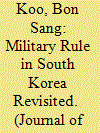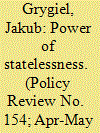| Srl | Item |
| 1 |
ID:
165927


|
|
|
|
|
| Summary/Abstract |
This paper revisits the military rule in Korea by paying attention, like Korean specialists, to the disconnection in dictatorship but like comparativists, using the tools in comparative studies of modern authoritarian regimes. This paper argues that the differences in the military leaders’ orientations (personalist vs. party-based type) and survival strategies to deal with potential threat sources (key insiders, political opponents, and economic elites) entailed different regime pathways. Examining (a) how to form a ruling group in terms of unity (competing factions vs. a single dominant faction), (b) how to control the legislative branch (directly controlled organization vs. opposition parties indirectly supported by the government), and (c) how to manage capital owners (tight constraints vs. financial liberalization with occasional punishments), this paper provides an explanation as to why only the second military regime was able to open the door to democratization instead of giving way to authoritarian replacement in Korea.
|
|
|
|
|
|
|
|
|
|
|
|
|
|
|
|
| 2 |
ID:
090332


|
|
|
| 3 |
ID:
097754


|
|
|
|
|
| Publication |
2010.
|
| Summary/Abstract |
Speculation about the future of the North Korean regime has been intense for nearly two decades. In the 1990s, economic crises and famine led to predictions of the Kim regime's imminent downfall. Today analysts highlight impending famine as well as threats to the regime's position brought by eroding information control. Several theories of authoritarian control help to explain how Kim Jong-il and his family have remained in power and how this might change over time. The Kim regime has employed a variety of authoritarian "tools" to protect itself both from popular revolt and from internal coups. Its social policies, reliance on certain ideas and nationalism, and use of force prevent the onset of revolution. Through numerous other tools (elite co-optation, manipulation of foreign governments for financial aid, and the "coupproofing" of domestic institutions), the regime protects itself from coups d'état and elite unrest. This framework not only helps to explain the past resilience of the regime, but it suggests that the regime is not in danger of being unseated by coups or revolution. Yet it also suggests that the regime has not adequately prepared for succession after Kim's death. This analysis has implications for policy planning about the future of the Korean Peninsula, as well as for negotiations with and coercive strategies toward Pyongyang.
|
|
|
|
|
|
|
|
|
|
|
|
|
|
|
|
| 4 |
ID:
150967


|
|
|
|
|
| Summary/Abstract |
China watchers are often obsessed with the prospects for regime change in that country. During the post-Mao period in China, the ruling Chinese Communist Party (CCP, or simply the Party) has liberalized its control over the economy while protecting its monopoly on political power. Although an increasingly market economy may seem incompatible with a Leninist political system, this is the combination China's leaders have pursued for almost four decades.
|
|
|
|
|
|
|
|
|
|
|
|
|
|
|
|